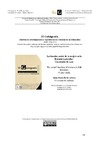Identificador persistente para citar o vincular este elemento:
https://accedacris.ulpgc.es/jspui/handle/10553/74213
| Campo DC | Valor | idioma |
|---|---|---|
| dc.contributor.author | Devís Arbona, Anna Maria | en_US |
| dc.date.accessioned | 2020-09-01T10:41:24Z | - |
| dc.date.available | 2020-09-01T10:41:24Z | - |
| dc.date.issued | 2020 | en_US |
| dc.identifier.issn | 2386-3374 | en_US |
| dc.identifier.uri | https://accedacris.ulpgc.es/handle/10553/74213 | - |
| dc.description.abstract | En investigaciones anteriores se ha desarrollado la importancia de la literatura popular en el desarrollo de la competencia intercultural en el aula (Devís, 2015; Devís & Chireac, 2015a, 2015b; Morón & Devís, 2016; Devís & Chireac, 2017). En el presente estudio nos planteamos analizar los personajes femeninos en una muestra de cuentos populares recogidos en diversos lugares de los actuales Estados de Haití y República Dominicana con el objetivo de establecer la función social de la mujer que nos permita reflexionar sobre las posibilidades didácticas en la educación Primaria y Secundaria. Así pues, los objetivos son: Analizar la importancia de la literatura popular como exponente de la cultura a la que pertenece, valorar la función social de la mujer en la muestra de cuentos populares considerados y establecer los referentes comunes entre varias culturas con el fin de favorecer el diálogo intercultural en las aulas. | en_US |
| dc.description.abstract | In previous research it has developed the importance of popular literature in the development of intercultural competence in the classroom (Devís, 2015; Devís & Chireac, 2015a, 2015b; Morón & Devís, 2016; Devís & Chireac, 2017). The current study proposes an analysis of the female characters of a series of folk tales collected in various locations of today´s Haiti and Dominican Republic with the aim of establishing the social function of women that allows us to reflect on the didactic possibilities in Primary and Secondary education. Thus, the objectives are as follows: To analyze the importance of folk literature as representative of the culture to which it belongs, to value the social role of women as highlighted in the sample folk tales selected and to establish common benchmarks for different cultures. | en_US |
| dc.language | spa | en_US |
| dc.relation.ispartof | El Guiniguada | en_US |
| dc.source | El Guiniguada [ISSN 0213-0610], n. 29, p. 54-64, (2020) | en_US |
| dc.subject | 58 Pedagogía | en_US |
| dc.subject | 531204 Educación | en_US |
| dc.subject.other | Educación intercultural | en_US |
| dc.subject.other | Literatura infantil y juvenil | en_US |
| dc.subject.other | Representación mental de la mujer | en_US |
| dc.subject.other | Intercultural education | en_US |
| dc.subject.other | Children's and jouth literature | en_US |
| dc.subject.other | Mental representation of women | en_US |
| dc.title | La función social de la mujer en la literatura popular: Un estudio de caso | en_US |
| dc.title.alternative | The social function of women in folk literature: A case study | en_US |
| dc.type | info:eu-repo/semantics/article | en_US |
| dc.type | Article | en_US |
| dc.description.lastpage | 64 | en_US |
| dc.description.firstpage | 54 | en_US |
| dc.relation.volume | 29 | en_US |
| dc.investigacion | Artes y Humanidades | en_US |
| dc.type2 | Artículo | en_US |
| dc.description.numberofpages | 11 | en_US |
| dc.utils.revision | Sí | en_US |
| dc.identifier.ulpgc | Sí | es |
| dc.description.sellofecyt | Sello FECYT | |
| dc.description.esci | ESCI | |
| dc.description.dialnetimpact | 0,0 | |
| dc.description.dialnetq | Q2 | |
| dc.description.erihplus | ERIH PLUS | |
| item.grantfulltext | open | - |
| item.fulltext | Con texto completo | - |
| Colección: | Artículos | |
Visitas
60
actualizado el 24-feb-2024
Descargas
14
actualizado el 24-feb-2024
Google ScholarTM
Verifica
Comparte
Exporta metadatos
Los elementos en ULPGC accedaCRIS están protegidos por derechos de autor con todos los derechos reservados, a menos que se indique lo contrario.
